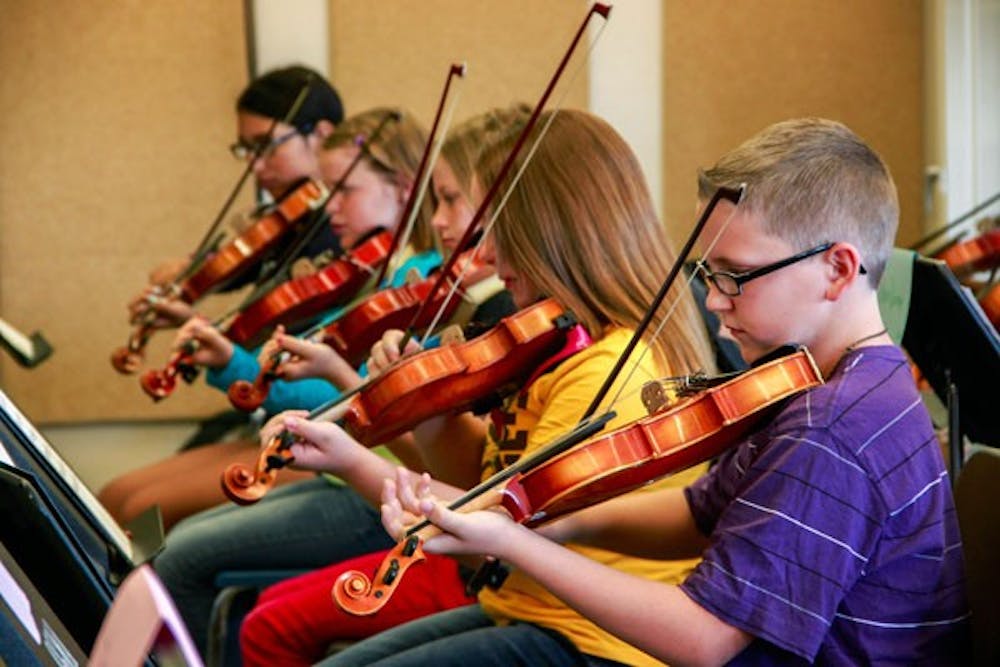 Participants in the ASU Strings Project playing the violin on the second floor of ASU Gammage. Participants are taught string instruments by music education or performance majors at ASU. (Photo by Abhiram Chandrashekar)
Participants in the ASU Strings Project playing the violin on the second floor of ASU Gammage. Participants are taught string instruments by music education or performance majors at ASU. (Photo by Abhiram Chandrashekar)
Every Saturday at 9 a.m., the second floor of ASU Gammage swells with the sounds of children playing stringed instruments, such as violins and violas.
However, the children aren't taught by University instructors; the teachers are ASU students seeking to gain experience in their career path. The student instructors are freshmen, sophomores and juniors majoring in music education or performance.
The ASU String Project is part of a national program that provides music lessons for children who might not have the financial resources, while giving college students the experience to be a successful string teacher, program director Margaret Schmidt said.
"There is no substitute for learning how to teach other than doing it," Schmidt said. "You can read and read and read about teaching, but until you do it, you don't get the experience of how to respond to different students."
The program is offered each semester to fourth through sixth graders for a fee, which can be waived for students that cannot pay it. The children who sign up can choose between taking a series of 10 group classes for a cheaper fee or 10 private lessons.
Schmidt started the ASU chapter of the String Project in January 2002 with 100 children signing up for the program. This was an unexpected and enormous response, she said.
"We started with about 100 students the first semester, and that was more than we had expected," Schmidt said. "We had to shoehorn them in to fit them in the classroom."
This semester, the program has grown to accommodate 200 children.
Music education junior Dora Lim has been teaching group classes with the String Project for two years. She said teaching in a group setting has given her a rare opportunity that will be useful after she graduates.
"We start interning and student teaching our last year or two years of being in college," Lim said, "But as a freshman, you can start out already teaching classes, and you have the teachers in the back who have been teaching for decades who know what they are doing and can help you."
Lim said she hopes to be able to apply the experience she is gaining from the program when she graduates and begins teaching music. She said she prefers to teach students in a high school symphony.
Ali Smurawa, a music education freshman who teaches group classes, said she finds teaching to be rewarding despite challenges that result from different learning styles.
"When they understand something and you can see that light in their eyes and something just clicks," Smurawa said. "That is the best feeling, knowing that you were the one who taught them."
Donna Janowski, a music education junior and third year String Project teacher, said she hopes to teach strings in public schools.
She said working with the students changed the program from just a chance to gain experience to something she looks forward to every week.
"When I found out I could start teaching as a freshman, I was ecstatic," Janowski said. "I wanted to get involved for the great experience, and it has turned out to be my favorite part of the week."
Violin performance junior Alexandra Birch has been teaching private lessons with the String Project for two semesters and said it will give her the necessary experience to work as a teacher's assistant when she begins receiving her master's degree.
Birch said the String Project provides a feasible alternative to music education programs that are being cut in the public school system.
"A lot of times there is just not something like (the String Project) in the community," Birch said. "I feel like we are really filling a gap in the Phoenix community."
Reach the reporter at sgslade@asu.edu or follow her on Twitter @shelbygslade




